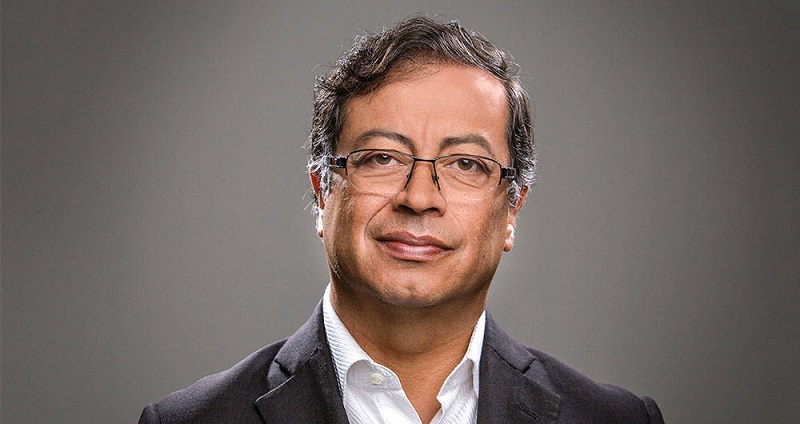RIO DE JANEIRO, BRAZIL – Gustavo Petro, the candidate of the Historical Pact, won the second round of Colombia’s presidential elections on Sunday (19).
After counting 98.86% of the votes, Petro received 50.49% of the vote compared to 47.25% for the right-wing Rodolfo Hernández, known as the “Colombian Trump.”
On his Twitter account, Petro celebrated the victory. “Today is a day of celebration for the people. May the first victory of the people be celebrated. May so much suffering be absorbed in the joy that floods the heart of the homeland today,” he said.

Hernández also expressed his gratitude live on Twitter. “Colombians, today, most citizens who voted chose another candidate. I accept the result as it should be if we want our institutions to be strong. I sincerely hope this decision will be good for everyone,” he stated.
“I ask Doctor Gustavo Petro to remain faithful to his speech against corruption and not disappoint those who trusted him,” he said.
WHO IS GUSTAVO PETRO
The 62-year-old economist was born in the city of Ciénaga de Oro in the province of Córdoba. At 17, he was a member of the M-19 guerrilla movement, which was dissolved in 1990. At the same time, he was studying economics at the University Externato in Bogotá. He was arrested in 1985 for illegally possessing weapons and served an 18-month prison sentence.
The guerrilla group was transformed into the political party M-19 Democratic Alliance. Petro helped to found it.
Petro participated in the drafting of the Colombian constitution in 1990. A year later, he was elected as a deputy for the M-19 for four years. However, after receiving death threats, he went into exile in Europe for two years.
Petro gained popularity for his denunciations of corruption and links between politicians and criminal gangs, as well as for exposing the illegal machinations of then-President Álvaro Uribe. When he returned to Colombia, he was elected for a second term as a deputy in 1998. In 2006, he became a senator and received the third-most votes.
Petro ran for president for the first time in 2010. However, he received 9% of the vote. After this defeat, he was elected mayor of Bogotá. He served in office from 2012 to 2015.
In 2018, he ran again for the presidential election. He was defeated in the second round by Iván Duque. Because of his closeness to former Venezuelan President Hugo Chávez (1954-2013), he was accused by the opposition of trying to turn the country into a “Venezuela.
During his campaign for president, Petro said he wanted to “change the country’s history “. He defended repealing the Iván Duque government’s tax reform and the taxation of large fortunes. He intends to pursue a policy of environmental protection and valorize local production. Other goals of his government are to fight social inequality and “deepen democracy.”
Petro also promised to ask the United Nations (UN) to set up a commission to “investigate the main corruption crimes in the country and put an end to impunity.”
During the election campaign, the new Colombian president directed his speech against the establishment. He promised greater state participation in the economy with a structure “based on production, not extraction.”
“It is impossible to have a Latin America – left or right – that lives on gas, oil, or copper. The only way for sustainable development in Latin America is knowledge, is production,” he said in a July 2021 interview with CNN Chile.
LEFTIST GOVERNMENT
With Petro’s victory, Colombia joins other Latin American countries with leftist governments. The shift to the left began with the election of leftist Andrés Manuel López Obrador in Mexico in 2018.
It was followed by Argentina with Alberto Fernández in 2019 and Bolivia with Luis Arce in 2020. The following year, 2021, it was Peru’s turn with Pedro Castillo, Chile with Gabriel Boric, and Honduras with Xiomara Castro.
According to the International Institute for Democracy and Electoral Assistance (IDEA), pendulum swings and polarization of the political spectrum have characterized the last decade in the region. The organization’s study analyzes democratic trends in Latin America before and during the pandemic.
When commodity prices collapsed in the mid-2010s, economies dependent on commodity exports suffered the effects, leading to the election of right-leaning politicians. Now there is a countermovement in Latin America, but also a movement of discontent going in the opposite direction.
Although it started before the pandemic, IDEA says the devastation caused by Covid-19 is one of the main factors behind this turnaround.
“The Covid-19 pandemic has hit hard Latin America and the Caribbean, a region plagued by unresolved structural problems such as high crime and violence, political fragmentation and polarization, poverty and inequality, corruption, and state weakness. Long-delayed political and socio-economic reforms in the region have exacerbated the economic and health crises caused by the pandemic,” the document says.
ALLEGATIONS OF IRREGULARITIES
The Election Observation Mission (EOM) registered 310 electoral irregularities complaints by the election’s end. According to the agency, the localities with the most reported alleged irregularities were: Antioquia, Valle del Cauca, Atlantico, Risaralda, and Bogotá.
At least 83 complaints were related to the right to vote. The office also received complaints of coercion by employers who forced or threatened their workers to vote for their favored candidate.

